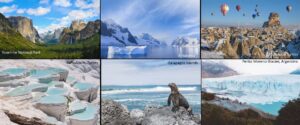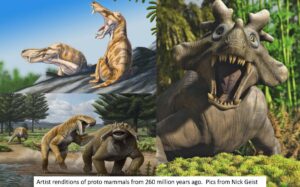Why did I become a scientist?
I guess that is a question that is asked a great deal to me. My first thought is what an odd question, as for me being a scientist (and especially a professor) is probably the coolest, most fun job I can have. Scientists spend their lives exploring, learning, discovering, and being creative to try to figure out and better understand how our planet works.
In fact, we are all born as explorers, and artists and always trying to figure things out. So, try to remember back when you were a young kid, we always loved investigating, playing, creating, and making things out of our imagination. Well, that is what a scientist does for a living. I teach a few classes per semester, in which I get the opportunity to share what I have learned as well as my enthusiasm and passion for what I do to young people that are remarkably like who I was when I was a student.

Besides enjoying teaching, as a professor, I can pick and choose exactly what I would like to do research on. There is no boss, telling me to push some papers from one side of the desk to another or someone dictating what type of science I must do. I also love learning and being a researcher requires that I always keep learning.
Why am I so passionate about learning? It comes down to trying to understand the beauty and magic of nature and the world around us. The world is so incredibly beautiful and rich with diversity in every way. When I learn and discover more about how our planet has evolved and the processes that shape it, I develop a deeper appreciation when I later see nature in all of her majesty and surreal beauty. With this understanding there comes a feeling deep down inside that is impossible to describe, but it is my own personal experience to be cherished.

The magic, beauty, and mystery of this planet are one of the greatest gifts given to humanity. Being a scientist is a full-time job in being immersed in observing, learning, and exploring this incredible world we call Earth. I spend my day, collecting & analyzing data, coming up with new ideas, and finally writing up papers to describe the world that we live in. I also have to read a great deal to keep up with all of the new discoveries that other scientists are coming up with. So, being a researcher is a full-time job of exploring and learning.
There is also a practical aspect as well. While each type of science provides rich and rewarding knowledge that can aid and improve the human condition, Geology can provide a perspective of our world that is perhaps unique in the science. To paraphrase one of the great paleontologists of our time, Bill Berggren,
“it is the [geologist] who has the responsibility of unlocking the key to time that is buried in the deep sea and in the mountain chains of the world and once having done so, reveal the mysteries of the evolution of life itself…. A noble calling indeed.”
Looking at the Earth in four dimensions
However, while I am speaking of mainly the present-day world, it is when we add the fourth dimension, time, that the history of our planet becomes just “out of this world”. In fact, I often ask my students at the beginning of the semester, “who likes science fiction, or who would like to travel to another planet?” “Well, you do not need Star Wars or Mr. Spock, you just have to take my Historical Geology class.”

For example, going back just 5% back into Earth’s past, and looking down from a spaceship, we would not be able to recognize any of the continents. This is because they had all collided with a supercontinent called Pangea. If you landed and walked around, you recognize almost none of the species, sure some would look similar, but we would see strange and exotic forms that would resemble someone’s creative imagination in a sci-fi movie.

And this is only 5% of Earth’s history. Just imagine the other 95%! I have always liked Star Trek and the idea of traveling to another world. But, once I got into geology, I realized that I can visit strange worlds with fauna and flora that do not exist today and I can be the one to explore and discover new insights into these “other worlds”.
You can also become a time traveling explorer and detective by taking a geology class or having a chat with me!!!
P.S. we have arrived at our new site and we are drilling as we speak. I will try to post something about what we are doing soon.